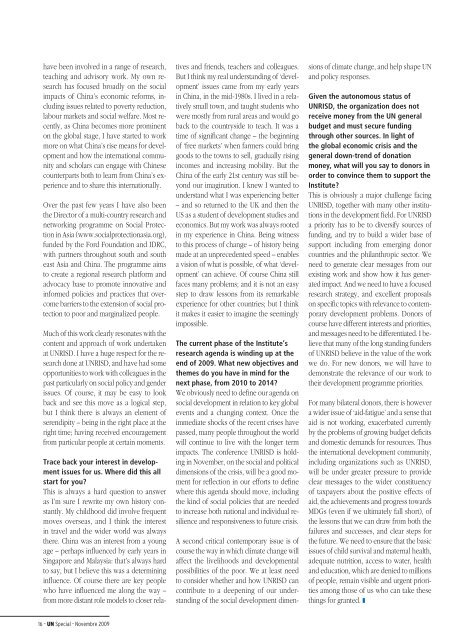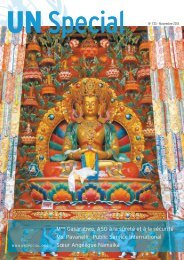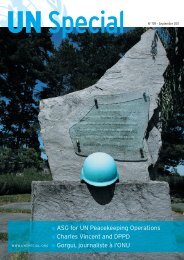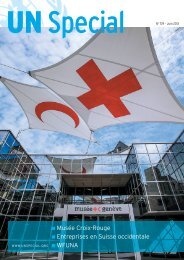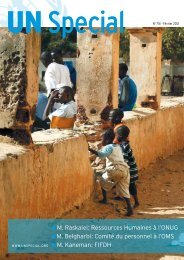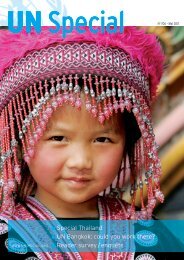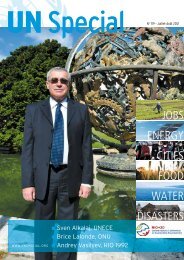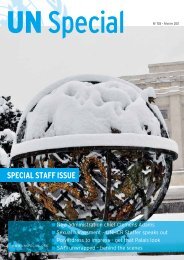PDF version - UN Special
PDF version - UN Special
PDF version - UN Special
Create successful ePaper yourself
Turn your PDF publications into a flip-book with our unique Google optimized e-Paper software.
have been involved in a range of research,teaching and advisory work. My own researchhas focused broadly on the socialimpacts of China’s economic reforms, includingissues related to poverty reduction,labour markets and social welfare. Most recently,as China becomes more prominenton the global stage, I have started to workmore on what China’s rise means for developmentand how the international communityand scholars can engage with Chinesecounterparts both to learn from China’s experienceand to share this internationally.Over the past few years I have also beenthe Director of a multi-country research andnetworking programme on Social Protectionin Asia (www.socialprotectionasia.org),funded by the Ford Foundation and IDRC,with partners throughout south and southeast Asia and China. The programme aimsto create a regional research platform andadvocacy base to promote innovative andinformed policies and practices that overcomebarriers to the extension of social protectionto poor and marginalized people.Much of this work clearly resonates with thecontent and approach of work undertakenat <strong>UN</strong>RISD. I have a huge respect for the researchdone at <strong>UN</strong>RISD, and have had someopportunities to work with colleagues in thepast particularly on social policy and genderissues. Of course, it may be easy to lookback and see this move as a logical step,but I think there is always an element ofserendipity – being in the right place at theright time; having received encouragementfrom particular people at certain moments.Trace back your interest in developmentissues for us. Where did this allstart for you?This is always a hard question to answeras I’m sure I rewrite my own history constantly.My childhood did involve frequentmoves overseas, and I think the interestin travel and the wider world was alwaysthere. China was an interest from a youngage – perhaps influenced by early years inSingapore and Malaysia: that’s always hardto say, but I believe this was a determininginfluence. Of course there are key peoplewho have influenced me along the way –from more distant role models to closer relativesand friends, teachers and colleagues.But I think my real understanding of ‘development’issues came from my early yearsin China, in the mid-1980s. I lived in a relativelysmall town, and taught students whowere mostly from rural areas and would goback to the countryside to teach. It was atime of significant change – the beginningof ‘free markets’ when farmers could bringgoods to the towns to sell, gradually risingincomes and increasing mobility. But theChina of the early 21st century was still beyondour imagination. I knew I wanted tounderstand what I was experiencing better– and so returned to the UK and then theUS as a student of development studies andeconomics. But my work was always rootedin my experience in China. Being witnessto this process of change – of history beingmade at an unprecedented speed – enablesa vision of what is possible, of what ‘development’can achieve. Of course China stillfaces many problems; and it is not an easystep to draw lessons from its remarkableexperience for other countries; but I thinkit makes it easier to imagine the seeminglyimpossible.The current phase of the Institute’sresearch agenda is winding up at theend of 2009. What new objectives andthemes do you have in mind for thenext phase, from 2010 to 2014?We obviously need to define our agenda onsocial development in relation to key globalevents and a changing context. Once theimmediate shocks of the recent crises havepassed, many people throughout the worldwill continue to live with the longer termimpacts. The conference <strong>UN</strong>RISD is holdingin November, on the social and politicaldimensions of the crisis, will be a good momentfor reflection in our efforts to definewhere this agenda should move, includingthe kind of social policies that are neededto increase both national and individual resilienceand responsiveness to future crisis.A second critical contemporary issue is ofcourse the way in which climate change willaffect the livelihoods and developmentalpossibilities of the poor. We at least needto consider whether and how <strong>UN</strong>RISD cancontribute to a deepening of our understandingof the social development dimensionsof climate change, and help shape <strong>UN</strong>and policy responses.Given the autonomous status of<strong>UN</strong>RISD, the organization does notreceive money from the <strong>UN</strong> generalbudget and must secure fundingthrough other sources. In light ofthe global economic crisis and thegeneral down-trend of donationmoney, what will you say to donors inorder to convince them to support theInstitute?This is obviously a major challenge facing<strong>UN</strong>RISD, together with many other institutionsin the development field. For <strong>UN</strong>RISDa priority has to be to diversify sources offunding, and try to build a wider base ofsupport including from emerging donorcountries and the philanthropic sector. Weneed to generate clear messages from ourexisting work and show how it has generatedimpact. And we need to have a focusedresearch strategy, and excellent proposalson specific topics with relevance to contemporarydevelopment problems. Donors ofcourse have different interests and priorities,and messages need to be differentiated. I believethat many of the long standing fundersof <strong>UN</strong>RISD believe in the value of the workwe do. For new donors, we will have todemonstrate the relevance of our work totheir development programme priorities.For many bilateral donors, there is howevera wider issue of ‘aid-fatigue’ and a sense thataid is not working, exacerbated currentlyby the problems of growing budget deficitsand domestic demands for resources. Thusthe international development community,including organizations such as <strong>UN</strong>RISD,will be under greater pressure to provideclear messages to the wider constituencyof taxpayers about the positive effects ofaid, the achievements and progress towardsMDGs (even if we ultimately fall short), ofthe lessons that we can draw from both thefailures and successes, and clear steps forthe future. We need to ensure that the basicissues of child survival and maternal health,adequate nutrition, access to water, healthand education, which are denied to millionsof people, remain visible and urgent prioritiesamong those of us who can take thesethings for granted. ❚16 – <strong>UN</strong> <strong>Special</strong> – Novembre 2009


